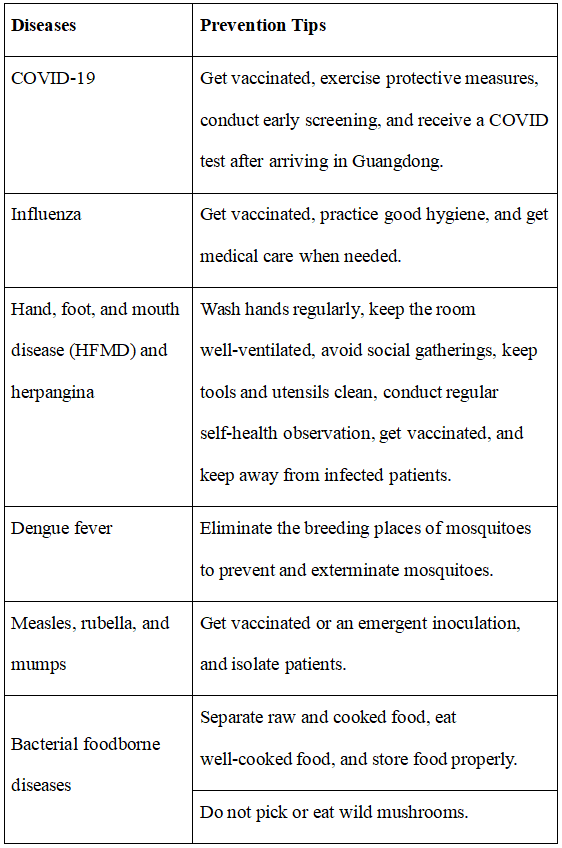As the midsummer has arrived, the temperature and humidity have drastically increased. Some contagious diseases are easily transmitted, especially among children. Residents need to pay attention to these 9 contagious diseases in June.
Heres a simplified version of disease prevention advice:

Details are as follows:
COVID-19
The overall epidemic situation in Guangdong has improved greatly. However, given Omicrons transmission strength, Guangdong still faces the pressure of imported cases from abroad and domestic cases from other provinces. It is recommended to get vaccinated, exercise protective measures and conduct early screening.
*Note:
1. If arrivals to Guangdong are from risky areas, please take the initiative to report to the community and cooperate with local health management measures.
2. If you come to Guangdong from other provincial-level regions, its suggested to take a nucleic acid test upon arrival and conduct self-health monitoring.
Influenza
In May, the percentage of outpatient visits for influenza-like illness (ILI%) showed an upward trend, but it was still below the base line. The positive rate has also shown an upward trend recently, with influenza A (H3N2) virus as the main type.
Key venues are schools, childcare institutions, hospitals, and other collective units. High-risk groups, including children, the elderly, patients with chronic diseases, and medical staff should be vaccinated against influenza in a timely manner.
Prevention tips:
Those aged 6 months and above who are willing to be vaccinated against influenza and have no contraindications should get vaccinated.
Practice good hygiene, such as wash hands regularly, wear masks, and keep rooms well-ventilated.
Wear a mask when you have influenza-like symptoms (body temperature above 38°C, cough or sore throat) and seek immediate medical attention.
HFMD and herpangina
In June, the prevalence of hand, foot, and mouth disease (HFMD) in Guangdong will increase more significantly than that in May. The risk of HFMD outbreak will rise.
Key venues: childcare institutions.
Prevention Tips:
Keep hands sanitized.
Open windows regularly for better ventilation.
Avoid gatherings, especially in indoor facilities.Clean childrens daily-used items regularly.
Conduct regular health observation for children.
Get EV71 vaccines for children (6 months old - 5 years old), preferably before 12 months old.
Stay away from infected patients.
Dengue fever
Guangdong reported the first imported case of dengue fever at the end of May. Recently, the mosquito density in Guangdong has increased, and the risk of imported dengue fever in June will increase.
Key areas of disease prevention and control:
Guangzhou, Shenzhen, Foshan, Dongguan, and other cities that receive inbound arrivals, as well as Shantou, Zhanjiang, Jiangmen, Chaozhou, Jieyang, and Yangjiang, where clusters of local infections have occurred in recent years.
Prevention Tips:
Eliminate breeding places of mosquitoes.
Clean up rubbish storage or pound areas and clear small containers of trash.
Wear light-colored, long-sleeved clothes and long trousers when going out. Install screen doors and windows, and use mosquito nets at home.
Avoid staying in places where mosquitoes infest frequently and apply mosquito repellent spray to exposed skin and clothes.
Use pesticide, mosquito coils, electric mosquito swatters, etc. to exterminate mosquitoes.
Measles, rubella, and mumps
In June, infections of measles and rubella in Guangdong are increasing, with the incidence of mumps remaining at a high level.
Prevention Tips:
Schools and other collective units should implement relevant disease prevention and control measures such as morning inspection, registration of absences due to illness, keeping rooms well-ventilated and regular disinfection.
Once a case is detected, the patient must be strictly isolated, the area disinfected, and reported in time, and prevention and control measures should be conducted, for example, getting an emergent inoculation.
Vaccination: The easiest and most effective way to prevent measles, rubella, and mumps is to get 2 doses of vaccine containing the corresponding ingredients.
*Note:
It is recommended that women of reproductive age receive rubella-containing vaccines and pre-pregnancy eugenic examinations before pregnancy.
Emergent inoculation: Susceptible individuals who are in close contact with the patient (those who have not suffered from the corresponding disease previously, have not been vaccinated or have not been fully vaccinated) can receive emergent inoculation to avoid the disease or relieve symptoms.
Isolation of patients: In principle, measles patients should be isolated until 5 days after they develop a rash, and for those with concurrent pulmonary infection, isolation should be extended until 14 days after the rash appears. Rubella patients should be isolated until 5 days after they develop a rash. Mumps patients can leave isolation 5 days after swelling of the parotid glands goes away.
Bacterial foodborne diseases
In June, as the temperature rises and the typhoon season arrives, intermittent precipitation alternates with high temperatures. June to September has traditionally been the peak season of bacterial foodborne disease outbreaks in Guangdong. The outbreaks mostly take place in centralized catering units, especially in coastal tourist spots, where vibrio parahaemolyticus infection is more likely to occur.
Plenty of rainfall during the Grain in Ear period can easily lead to the growth of toadstools. Beware of food poisoning caused by eating wild mushrooms.
Prevention Tips:
Separate raw and cooked food, eat well-cooked food and put leftovers in the refrigerator.
Do not pick or eat wild mushrooms.
Source | Guangdong CDC